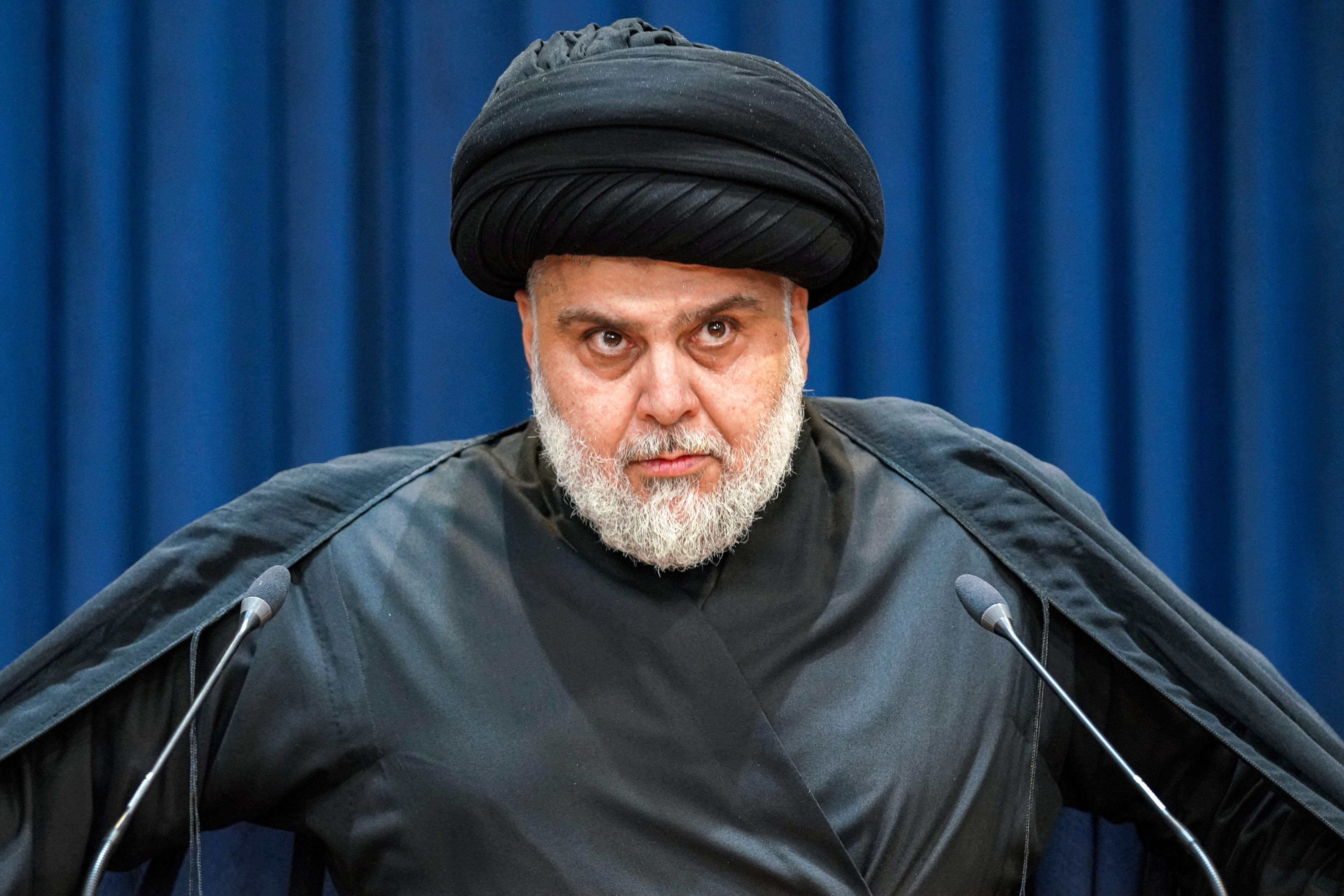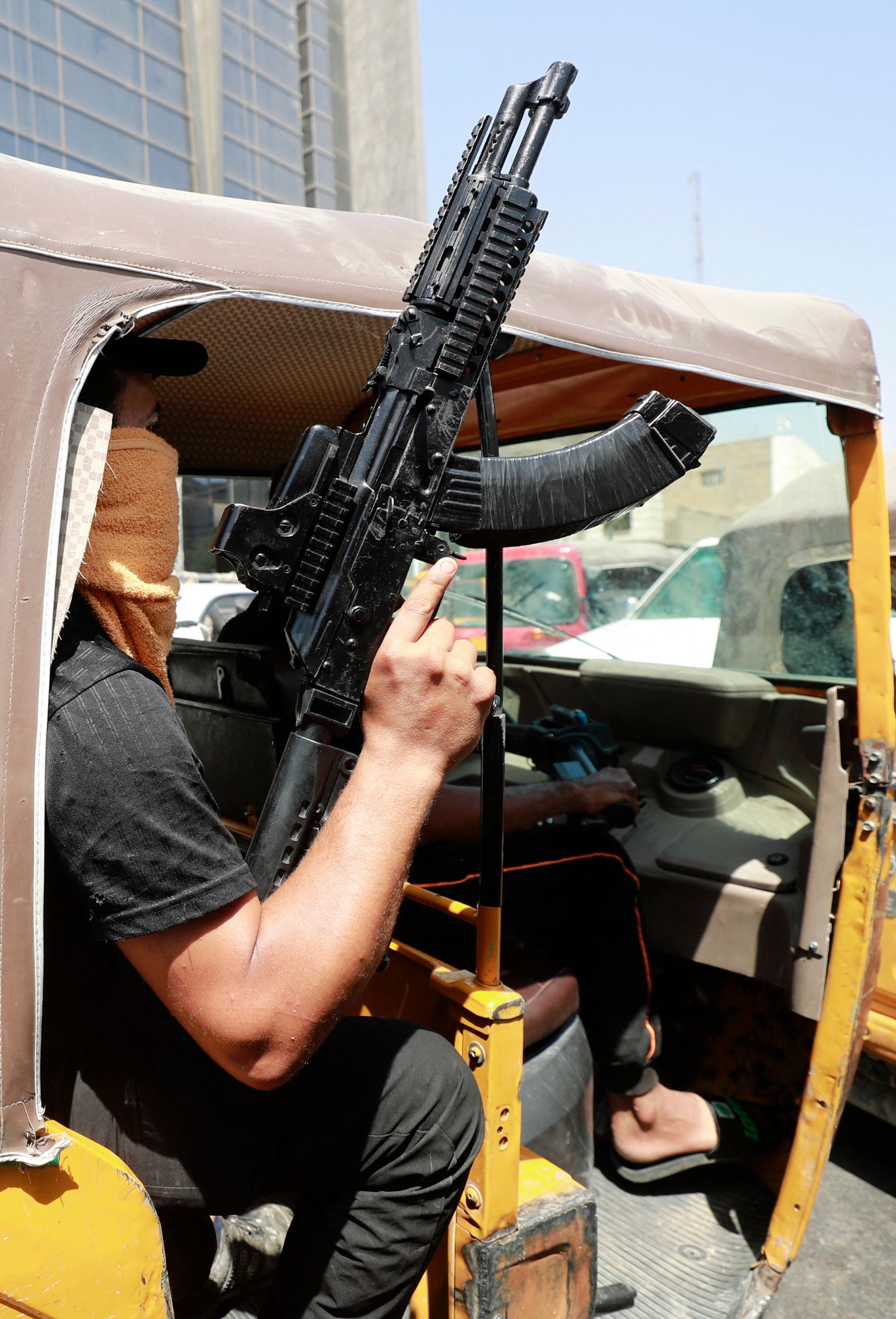‘With the click of a finger’: Moqtada al-Sadr calls an end to Iraq’s wave of violence
Firebrand cleric shows off his political power by turning on and off violence
Your support helps us to tell the story
From reproductive rights to climate change to Big Tech, The Independent is on the ground when the story is developing. Whether it's investigating the financials of Elon Musk's pro-Trump PAC or producing our latest documentary, 'The A Word', which shines a light on the American women fighting for reproductive rights, we know how important it is to parse out the facts from the messaging.
At such a critical moment in US history, we need reporters on the ground. Your donation allows us to keep sending journalists to speak to both sides of the story.
The Independent is trusted by Americans across the entire political spectrum. And unlike many other quality news outlets, we choose not to lock Americans out of our reporting and analysis with paywalls. We believe quality journalism should be available to everyone, paid for by those who can afford it.
Your support makes all the difference.Ferocious gunfire kept Baghdad on edge for nearly 18 hours as rival Shia militias battled it out. For the second time in a month, supporters of cleric Moqtada al-Sadr breached the walls of the Green Zone, and other Shia militias fought back, leaving at least two dozen dead across the capital and in the country’s south.
Witnesses described escalating clashes, with al-Sadr supporters attacking the offices of Shia militias and fighters battling it out with small arms, heavy-calibre weapons, drones, rockets and mortars.
Then, with a single speech, al-Sadr ended the chaos he had prompted. Order came back quickly. A nationwide curfew was lifted. Borders that had been closed because of the violence were reopened, and flights were resumed.
“Regardless of who started the strife yesterday, I apologise to the Iraqi people who are the only ones affected by what happened,” al-Sadr said in a speech on Tuesday. “We had hoped that there would be peaceful protests, not weapons. A revolution marred by violence and murder is not a revolution.”
Nearly two decades after he first burst onto Iraq’s political scene during the initial months that followed the United States-led invasion, al-Sadr continues to roil the country’s political establishment.
“What happened demonstrated his ability to mobilise, and mobilise with the click of a finger,” said Fanar Haddad, an Iraq expert at the University of Copenhagen. “He has shown the ability to bring down and save the entire edifice.”
The clashes, which took place across Baghdad, Basra and other largely Shia cities in the south, prompted the curfew and plunged much of the country into the sort of chaos and violence it has struggled to overcome since the 2003 invasion and toppling of Saddam Hussein.
The latest violence comes after nearly 11 months of political drift following inconclusive 2021 parliamentary elections that led to an ongoing deadlock over the formation of a government.
The al-Sadr loyalists acted after the 48-year-old cleric announced his “retirement” from politics over his frustration with Iraq’s process for forming a government. This is at least the third time he has done so since 2003.
Al-Sadr’s faction won the most seats in last October’s elections, but not nearly enough to form a government without the support of other factions. An Iranian-brokered coalition of other Shia parties and players has sought to woo him into forming an alliance. But al-Sadr has refused, instead proposing a coalition with Sunnis and Kurds – and failing that, new elections.
The wave of violence also came after obscure behind-the-scenes machinations in Iran, in which Ayatollah Kadhim al-Haeri, al-Sadr’s nominal religious patron, resigned his senior clerical post and directed his followers to support Iran’s supreme leader, Ayatollah Ali Khamenei. Experts called the move highly unusual.

“That was unprecedented,” said Haider al-Khoei, an Iraq analyst and the scion of a well-known religious family. “It was very strange that he would be resigning due to poor health, but then to order his followers to follow Khamenei. He just doesn’t have the authority.”
But the tensions that boiled over this week have been building for years. Al-Sadr, who hails from another well-known family, and whose high-ranking clerical father and uncle were murdered by Saddam’s Baathist regime, has long been the controversial bad boy of Iraqi politics, challenging first the American occupiers then focusing his ire on rival Shia factions.
“He believes he’s the main political representative of Iraqi Shia,” said Sajad Jiyad, a Baghdad-based scholar at the Century Foundation, a US think tank. “He believes all these other guys are sponsored by Iran and he was the only one here before 2003.”
Al-Sadr’s ambitions exceed his political and religious authority. Although his father and uncle both earned the highest ranks in the Shia clerical hierarchy, he lacks scholarly credentials. And despite his supporters being enthusiastic and well armed, they lack the ability to overpower the constellation of Iranian-backed militias – many of whom fought against Isis and Syrian rebel fighters – much less the Iraqi armed forces that crushed them in a 2010 confrontation.
Al-Sadr has accused the Baghdad government of corruption, incompetence, and fealty to Iran, and appears to be manoeuvring to supplant it. In reality, his faction has been an integral part of the Iraqi administration, and his political supporters, as well as his armed backers, have been as guilty of pilfering public funds, thuggery and doing the bidding of foreign powers as have other Shia groups.
Leaders of Iraq’s secular-liberal October 2019 pro-democracy uprising have been urged to stay out of the current fight. Government forces under the command of embattled prime minister Mustafa al-Khadim largely stepped back as the two sides confronted each other.

“It’s one armed corrupt faction fighting another armed corrupt faction,” said Khoei. “It’s essentially two armed mobs fighting each other.”
Long gone are the days when the US or UK ambassador in Baghdad could summon squabbling Iraqi political leaders to the embassy and hammer out an understanding. Experts say Iraqi politics has moved far beyond the realm wherein foreign powers could influence it.
“The Iranians are more powerful than the Americans and they haven’t been able to find a solution,” said Jiyad.
Some Western policymakers and Arabian peninsula monarchs have expressed support for al-Sadr as a possible counterweight to Iranian influence in Iraq. But experts cautioned that such a view risked further emboldening al-Sadr, and reinforcing the belief within his movement that it can use force to win concessions and power.
“They’ve done a terrible job with this belief that Moqtada is a panacea to countering Iran in Iraq, forgetting all the things Moqtada has done,” said Hamza Hadad, a Baghdad-based scholar at the European Council on Foreign Relations.
“This past week is a wake-up call to remind everyone that Iraqi politics isn’t black and white, and everyone is armed, so we need to be careful.”





Join our commenting forum
Join thought-provoking conversations, follow other Independent readers and see their replies
Comments